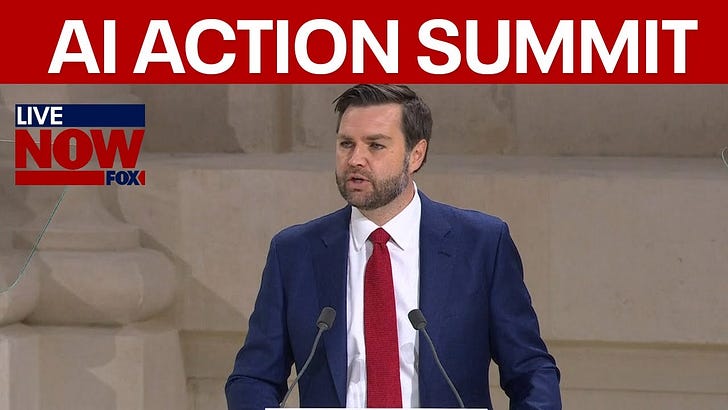Australia's Missing AI Action a Triumph of Safetyism over Innovation Enterprise
AI is a precarious path, says Minister for Industry and Science Ed Husic. But we're great at Quantum computing!
Last week two very different speeches at opposite ends of the planet, one from United States Vice President JD Vance at the Paris AI Action Summit, and the other by Australian Federal Minister for Industry and Science, Ed Husic at the National Press Club in Canberra, provided a perfect juxtaposition for the divergent cultures of a tech-driven superpower and a defensive slow-follower country.
“I’m not here this morning to talk about AI safety … I’m here to talk about AI opportunity,” said Vice President Vance at the Paris AI Action Summit, which saw 60-countries, led by the EU and including Australia, sign the Paris Declaration committed to regulating AI. China also signed. Only the US and Britain did not.
“Our administration, the Trump administration, believes that AI will have countless revolutionary applications in economic innovation, job creation, national security, health care, free expression, and beyond,” added Vance.
“And to restrict its development now would not only unfairly benefit incumbents in the space, it would mean paralyzing one of the most promising technologies we have seen in generations…
“We believe that excessive regulation of the AI sector could kill a transformative industry.”
Vance also made it clear the US is determined to win the AI arms race and, in a thinly veiled shot at China, warned that AI must remain free from ideological bias.
Back in Canberra a day after the Paris Declaration signing, Minister Husic declared that “trust in science is Australia’s superpower.” (Huh?)
The Minister, who was introduced at the NPC as “the minister responsible for building Australia’s future” also said AI can’t be trusted.
“An example of this precarious path lies in the phenomenal interest in artificial intelligence,” warned Minister Husic. “These are powerful technologies that can help us do things that are unimaginable. (He singled out the Covid Vaccines).
“The public is wary about something like AI that can so convincingly replicate human behaviour. We’re focused on seizing the benefits, while building trust. That’s why overnight we signed the Paris Declaration at the AI Action Summit.
“Unlocking AI growth in ways that benefit the economy and communities; that’s the focus too of our National AI Capability Strategy while developing the right guardrails for high-risk AI that might cause harm.”
Australia’s National AI Capability Strategy doesn’t exist. But the Minister loves to talk about as if it did. Something is expected by the end of 2025, if Labor gets a second term.
But until then, Australians will have to be content with imagining the unimaginable benefits of AI. Australian business and industry has been waiting more than 18 months for the Government to finalise its responsible AI guardrails legislation.
The Minister’s language is increasingly frustrating to business and tech industry CEOs and advocacy groups attending the recent closed door AI Capability roundtable in Sydney.
They say obsessive focus on vague Responsible AI regulatory design undermines private sector investment and paralyses industry wanting to leverage the transformative new platform technology.
Collectively they urged the Minister Husic to get beyond the slow-cooker design of vague regulatory guardrails and focus on unlocking AI’s economic opportunity.
In that same week, Federal Treasurer Jim Chalmers seemed to convey a new sense of urgency re AI development and experimentation in Australia when he had assured Business Council of Australia (BCA) members that the Government’s AI focus is “on the huge gains on offer, not just the guardrails.”
But then we didn’t hesitate to sign up to the Paris Declaration.
Put simply, the Paris declaration is the latest signal that the global AI battleground is divided between the “AI safety” armies led by the EU, and the accelerated innovation and aggressive economic opportunism of the US and China.
In the 21st century digital economy, only the hugely ambitious and rival American and Chinese approaches have won out, transforming the global economy and its geopolitics in the process. Now the two superpowers are streaks ahead in generative AI language models and agentic AI applications.
The defensive regulatory approach of the EU, and the even more risk averse, Australian way has cost their economies dearly in lost productivity, manufacturing complexity and 21st century skills development.
If we’ve learned anything about the AI arms race in the past few weeks since Chinese upstart, DeepSeek shocked the US rival tech giants with its high performance, low-cost open-source AI model, it should be that ambition and speed of experimentation and execution – not just eye-watering amounts of capital - are asymmetric advantages.
On all criteria, Australia is unarmed.
Keep reading with a 7-day free trial
Subscribe to Realpolitech to keep reading this post and get 7 days of free access to the full post archives.



